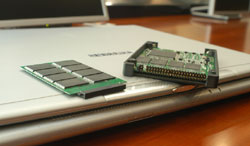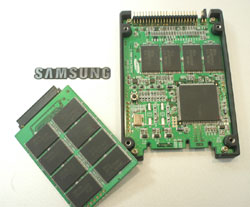Montag, 23. Mai. 2005 07:41 - [fs]
Das gezeigte Modell besitzt eine Kapazität von 16 GByte und bietet vor allem für mobile Notebooks Vorteile. Der Stromverbrauch liege bei fünf Prozent einer heutigen Notebookfestplatte, dementsprechend kühler bleibt der kleine Massenspeicher. Die SSD wiegt zudem weniger als die Hälfte, erzielt aber trotzdem Transferraten von 57 MByte/s lesend und 32 MByte/s schreibend. Um die Kompatibilität zu wahren, entwickelt Samsung Geräte, die wie heutige Festplatten per IDE oder SATA angesprochen und in bestehende 2,5 sowie 1,8 Zoll Slots eingebaut werden können. Im August möchte Samsung erste SSDs ausliefern.
Pressemitteilung
Samsung Electronics Develops Solid State Disk Using NAND Flash Technology
SEOUL, Korea – May 23, 2005: Samsung Electronics Co., Ltd., the leader in advanced semiconductor technology, today announced that it has developed the first Solid State Disk (SSD) based on NAND Flash memory technology.
The NAND-based SSD is a low power, lightweight storage media for notebook PCs, sub-notebook PCs and tablet PCs. Using the industry’s highest density 8 Gigabit NAND Flash, Samsung can build SSDs with a capacity of up to 16 GByte.

The SSD has a power consumption rate less than five percent of today’s hard disk drives (HDDs), enabling next generation mobile PCs to extend their battery life by more than 10 percent. The NAND-based SSD weighs less than half that of a comparably sized HDD.
Free of moving parts, the Samsung SSD memory has minimal noise and heat emission. Moreover, it is a highly reliable storage media that endures exceptionally well in environments with extreme temperatures and humidity, making it suited for industrial and military applications.

The SSD’s performance rate exceeds that of a comparably sized HDD by more than 150 percent. The storage disk reads data at 57 MegaBytes per second (MBps) and writes it at 32MBps.
The market leader in global NAND flash memory since 2002, Samsung has invested heavily to achieve double-density growth every year, further driving the market to higher memory densities and more affordable pricing.
To ensure compatibility, SSDs have been designed to look like HDDs from the outside. Samsung has developed a full line up of SSDs: 2.5-inch type SSDs that carry 16 NAND Flash devices of 4 Gbit or 8 Gbit density for 8 GBytes and 16 GByte of storage respectively. 1.8-inch type SSDs will also offer 4 GBytes or 8 GBytes of density.
The 1.8-inch type SSD will be available in August, 2005 for sub-notebook and tablet PCs.
Samsung expects NAND flash applications to expand from current applications in digital still cameras DSCs, MP3 players, and 3G mobile handsets to mobile and digital consumer appliances, as NAND Flash becomes more widely recognized as a reliable, high- density, data storage medium for the widest range of consumer demands.
 KING DEALS! Jetzt bis zu 60% auf Top-Hardware von Markenherstellern sparen!
KING DEALS! Jetzt bis zu 60% auf Top-Hardware von Markenherstellern sparen!  KING DEALS! Jetzt bis zu 60% auf Top-Hardware von Markenherstellern sparen!
KING DEALS! Jetzt bis zu 60% auf Top-Hardware von Markenherstellern sparen!